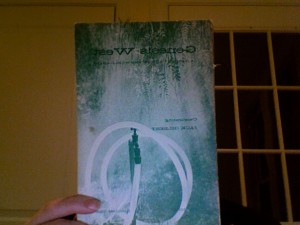Interview with Mike Topp

Mike Topp is somebody else. He wrote, among many other things, Shorts Are Wrong, a small compendium of jokes, scenes, pictures, stories, one liners, musings, words, as well as Happy Ending, about which Jonathan Lethem said, “I’m sorry, Mike, you know I love your work, but I’m just not whoring myself out for anyone else’s jacket copy anymore.” You can read Mike’s work all over the place, including these here and here.
More like a Kaufman than a Kundera, but somehow a mix of both, Mike is somehow often both funny and fun, and mind-moving. He gets up in that noggin good. Last month or so I did some e-talking with Mike, throwing words back and forth about his moves, his mind, and his forthcoming book from Publishing Genius, among other things.
– – –
Q: Mike, I read an interview last year with Gary Lutz where he referred to you as, I believe it was, “A writer’s writer’s writer.” That seemed a nice way to say it.
A. Gary’s someone I admire, and I was really pleased when I heard he said that. Unfortunately, he’s a stutterer and you have to factor that in. But Nat, who lives downstairs, says I’m a writer’s writer, and that’s almost as good. Plus I know for sure he doesn’t have a speech impediment.
Q. So… how do words appear inside your head?
A. They don’t–they appear in my hall closet, which makes things easier for me.
February 16th, 2010 / 1:18 pm
![]() Our boy Justin has a nice long podcast interview at Breakthru Radio, regarding mostly his on-fire Everything Here Is The Best Thing Ever. He also reads a full story from the book for your listening pleasure. If you haven’t caught wind of Justin’s firestorms of praise, and by god, picked up a copy of this beautiful thing, well, you should think about it. It’s every inch the hype portends.
Our boy Justin has a nice long podcast interview at Breakthru Radio, regarding mostly his on-fire Everything Here Is The Best Thing Ever. He also reads a full story from the book for your listening pleasure. If you haven’t caught wind of Justin’s firestorms of praise, and by god, picked up a copy of this beautiful thing, well, you should think about it. It’s every inch the hype portends.
“Writers are frequently seen as being unworldly figures, but, as it turns out, the White House and the CIA would have been better prepared for 9/11 if they had read American novelists and dramatists rather than field reports. After the attacks, the intelligence community reportedly consulted Hollywood screenwriters about likely future threats, having spotted that movies such as Die Hard anticipated the methods and level of terrorist threat to the US, but they might just as fruitfully have called in DeLillo, Charles McCarry and Kushner.”
A book you borrowed, never returned (not innocently or forgot; you damn well know it), still own (love?). Your chance to disclose. Go ahead:
“When you realize how little these people like being themselves, you begin to understand why they want to escape consciousness”

 Today at the tree-tucked magic barn of Grey Matter Books in Hadley, MA, I bought for $8 the very first issue of Genesis West, the magazine Gordon Lish edited pre-Quarterly, so we’re talking on the fun bus with Neal Cassady and not out to lunch with Raymond Carver. Grey Matter Books had the entire set of Genesis West, all seven volumes, except now they don’t, because Nat Otting owns six and I own one.
Today at the tree-tucked magic barn of Grey Matter Books in Hadley, MA, I bought for $8 the very first issue of Genesis West, the magazine Gordon Lish edited pre-Quarterly, so we’re talking on the fun bus with Neal Cassady and not out to lunch with Raymond Carver. Grey Matter Books had the entire set of Genesis West, all seven volumes, except now they don’t, because Nat Otting owns six and I own one.
In this 1962 issue is an interview between Lish and Jack Gilbert, whose book Views of Jeporody had at the time just won the Yale Younger Poets Series award. After the break are two cool excerpts from the conversation, one about that old hobbyhorse of poetry’s relevance, and one in which Gilbert takes to task the aesthetics of the Beat movement. The whole interview is terrific, and I post these excerpts not to signal unequivocal agreement with Gilbert’s grouching, but to air for the consideration of contemporary relevance some pretty solid gnashing from the early mouth of a major poet.
A new issue of Now Culture is loose, with a big emphasis on the short poem. Anyone who knows the recent me, knows I’m in a filthy love with the short poem. And so is Dara Wier. Here, she considers Keats’ ‘This Living Hand” and the inimitable powers of the short lyric. (click on the text of the poem to access the essay).
Short poems lend a seconds’ acknowledgment of our predicaments. They can be sniper-like in their direct action. I like that they aren’t working up to anything. I like that they employ no regimens of preparing the ground, or building up of logic or anecdote or image or sonic effects, they pretty much forego consolation and fearlessly approach archly flung truth. They lean hard on the notion of condensed (intensely so) remark.
February 15th, 2010 / 6:58 pm
Ronald Sukenick Video Interview 1997
RE: FC2, 98.6, small press longevity, obscenity, “experimental” vs. “innovative,” etc.
From the 1st edition of the original, 1771 three volume set of the Encyclopaedia Britannica: “SENTENCE, in grammar, a period or set of words, comprehending some perfect sense or sentiment of the mind.” Thus, by prior definition, many sentences are never sentences at all…
(1) Dalkey Archive reupped their website into a stare-machine. (2) They are also offering a special sale of 100 books for $500. Give the gift of a whole library, to yourself, or to your mom. (3) They have also announced a few new forthcoming releases, including new by Jean-Phillipe Toussaint, Patrik Ourednik, John Hawkes, Joshua Cohen, and more. Bamm.

